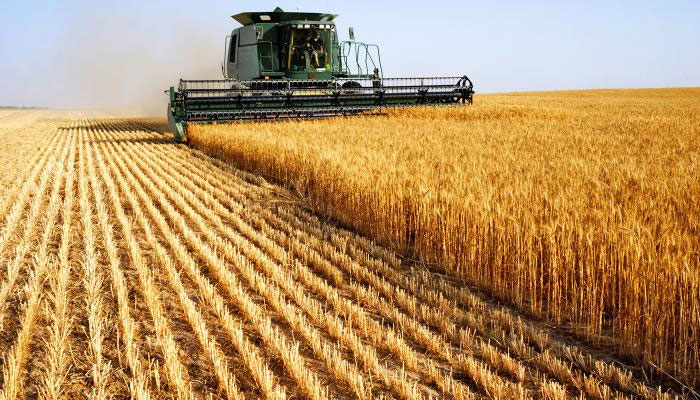Pakistan plans to import more wheat to stabilise flour prices
ISLAMABAD: The government has planned to import wheat to ensure its steady supply during the current year, a food ministry official said on Monday, as the agriculture-based economy is still struggling to meet domestic need of the staple food.
The secretary to the ministry of food security apprised the National Price Monitoring Committee (NPMC) about sufficient availability of wheat stocks across the country. He also briefed about arrangements underway to import wheat for building strategic reserves and to ensure steady supply during the current year. A summary will be presented before next the Economic Coordination Committee for requisite approval in this regard, he added.
While reviewing performance of the rabi crops (2020/21) last month, the Federal Committee on Agriculture estimated wheat production at 26.04 million tons, up 1.7 percent over the last year.
Presiding over the meeting, Minister for Finance and Revenue Shaukat Tarin stressed coordinated and consolidated efforts by all concerned to check undue profiteering and price hike to facilitate masses during the last week of Ramazan keeping in view the arrival of Eid, a statement said.
The minister directed the provincial administrations and concerned departments for strict monitoring of prices of basic commodities and ensure availability of sufficient stocks of basic commodities to provide relief to the consumers on the special occasion of Eid.
The finance minister directed the Pakistan Bureau of Statistics (PBS) to ensure that the data must represent and reflect prevailing prices trends including prices prevailing in Ramazan Saastaa/Sahulat Bazars for wide coverage.
While taking stock of the situation, Tarin urged all the provincial governments to ensure daily release of wheat on subsidized rates in compliance with the directives of the Prime Minister to keep the prices of wheat flour bags in check.
Minister for Food Security and Research Fakhar Imam, Special Assistant to Prime Minister on Finance and Revenue Waqar Masood and other senior officers participated in the meeting.
The NPMC reviewed the price trend of essential commodities especially wheat flour, sugar, edible ghee, chicken and vegetables during the last week. While briefing the committee about weekly sensitive price indicator, the finance secretary apprised that prices of nine basic commodities registered a decline whereas 30 items remained stable during the week under review.
In compliance with the earlier directions of the finance minister, the PBS updated the committee about data collection methodology and presented a detailed working regarding disparity between wholesale and retail prices of essential commodities.
After due deliberation, the NPMC directed PBS to further review its data collection methodology to reflect variation between wholesale and retail levels for basic commodities across different cities accurately.
-
 Winter Olympics 2026: Top Contenders Poised To Win Gold In Women’s Figure Skating
Winter Olympics 2026: Top Contenders Poised To Win Gold In Women’s Figure Skating -
 Inside The Moment King Charles Put Prince William In His Place For Speaking Against Andrew
Inside The Moment King Charles Put Prince William In His Place For Speaking Against Andrew -
 Will AI Take Your Job After Graduation? Here’s What Research Really Says
Will AI Take Your Job After Graduation? Here’s What Research Really Says -
 California Cop Accused Of Using Bogus 911 Calls To Reach Ex-partner
California Cop Accused Of Using Bogus 911 Calls To Reach Ex-partner -
 AI Film School Trains Hollywood's Next Generation Of Filmmakers
AI Film School Trains Hollywood's Next Generation Of Filmmakers -
 Royal Expert Claims Meghan Markle Is 'running Out Of Friends'
Royal Expert Claims Meghan Markle Is 'running Out Of Friends' -
 Bruno Mars' Valentine's Day Surprise Labelled 'classy Promo Move'
Bruno Mars' Valentine's Day Surprise Labelled 'classy Promo Move' -
 Ed Sheeran Shares His Trick Of Turning Bad Memories Into Happy Ones
Ed Sheeran Shares His Trick Of Turning Bad Memories Into Happy Ones -
 Teyana Taylor Reflects On Her Friendship With Julia Roberts
Teyana Taylor Reflects On Her Friendship With Julia Roberts -
 Bright Green Comet C/2024 E1 Nears Closest Approach Before Leaving Solar System
Bright Green Comet C/2024 E1 Nears Closest Approach Before Leaving Solar System -
 Meghan Markle Warns Prince Harry As Royal Family Lands In 'biggest Crises' Since Death Of Princess Diana
Meghan Markle Warns Prince Harry As Royal Family Lands In 'biggest Crises' Since Death Of Princess Diana -
 Elon Musk Weighs Parenthood Against AI Boom, Sparking Public Debate
Elon Musk Weighs Parenthood Against AI Boom, Sparking Public Debate -
 'Elderly' Nanny Arrested By ICE Outside Employer's Home, Freed After Judge's Order
'Elderly' Nanny Arrested By ICE Outside Employer's Home, Freed After Judge's Order -
 Keke Palmer On Managing Growing Career With 2-year-old Son: 'It's A Lot'
Keke Palmer On Managing Growing Career With 2-year-old Son: 'It's A Lot' -
 Key Details From Germany's Multimillion-euro Heist Revealed
Key Details From Germany's Multimillion-euro Heist Revealed -
 David E. Kelley Breaks Vow To Cast Wife Michelle Pfeiffer In 'Margo's Got Money Troubles'
David E. Kelley Breaks Vow To Cast Wife Michelle Pfeiffer In 'Margo's Got Money Troubles'




